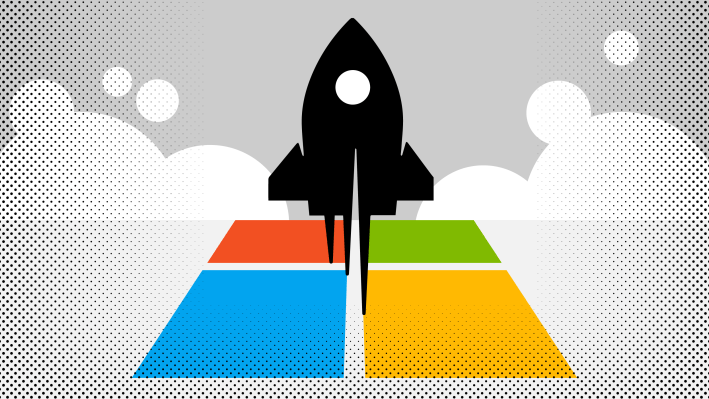Over the last few years, Microsoft has launched a number of programs for startups that range from free BizSpark credits for Azure and Microsoft’s developer and productivity tools, to Microsoft Ventures and the Microsoft Accelerator programs around the world. These different programs never quite told a cohesive story about Microsoft’s commitment to startups, though. Now, however, the company is launching Microsoft for Startups, a program that aims to bring technology and marketing expertise to startups and that — maybe most importantly — includes a co-selling program that allows startups to piggyback on Microsoft’s existing sales force.
In addition, Microsoft is tweaking some of its existing programs to better support the startups in its ecosystem.
In total, Microsoft is committing $500 million over the course of the next two years to run joint sales engagements and offer to startups access to technology and community spaces.
But let’s get the bad news out of the way first: The number of credits for startups in the BizSpark and BizSpark Plus program will go down (though not for startups currently enrolled in these programs). Microsoft argues that this isn’t a big deal, though, and that its free offerings are still competitive with those of its rivals.
Charlotte Yarkoni, Microsoft’s corporate VP of growth and ecosystem, told me that she spent quite a bit of time with startups in and outside of the Microsoft ecosystem after she took this new role about a year ago. What she heard wasn’t that startups wanted more free credits — instead, they wanted more help from Microsoft to bring their products to market.
At the same time, Microsoft was also looking for ways to differentiate its startup programs from those of its competitors. “We started building around this concept of helping to broaden the reach for startups and go beyond the typical cloud credits to how we build a different program,” said Yarkoni. “How can we evolve our accelerator program and pull that forward and also think through how we can build more of a campus and neighborhood feel.”
The result of this is Microsoft for Startups, which includes a number of different components. The first is an expansion of the Microsoft Reactors project. These are physical spaces where entrepreneurs, developers, investors and others can meet and where Microsoft hosts a number of different social events and classes. Microsoft currently operates these in Redmond, Seattle, San Francisco and New York. It’s now looking to open new ones in London, Sydney, Tel Aviv, Berlin, Shanghai and Beijing, and Yarkoni tells me that it may move its existing Reactors to larger spaces as their leases come up.
Microsoft Ventures, the company’s vehicle for investing in startups at the Series A to D stage, won’t see any major changes. “Ventures continues to expand and is run by a team that is very focused on our near-, mid- and long-term horizon needs,” Yarkoni said. “That program continues on as it is.”
The largest change will come to the Microsoft Accelerators program. This program is now called Microsoft ScaleUp, and for those startups that qualify for it, this program will now include the option of co-marketing and co-selling through Microsoft’s sales force.
“We tried to build a way to plug our startups into our sales engine,” Yarkoni said. Startups will get all the usual accelerator benefits, including access to Microsoft’s technology and expertise, but in addition, Microsoft is training and incentivizing its own sellers to sell these startups’ tools to its customers. These startups do need to be ready for this, of course, and for the most part, we are talking about B2B startups here that target the enterprise market.
One of the first companies in this program, which Microsoft has been quietly testing for a few months now, is the marketing intelligence platform Affinio. Affinio CEO Tim Burke, whose company went through the Microsoft Accelerator program in Seattle in 2016, told me that Microsoft is not just giving his company a clear playbook to follow, but also providing help with creating collateral like content, case studies and video content. He also stressed that Microsoft didn’t just give him a checklist to follow but that he had plenty of check-ins and meetings with Microsoft to push this ahead. “The unique thing with this is that Microsoft has this down to a science — all the way down to the playbook,” Burke said. He also stressed that he has seen a shift in how Microsoft approaches startups. “You can see and feel the shift,” he told me. “It’s amazing how the organization as a whole has bought in. Everybody knows the goal and direction.”
Affinio, which mostly targets larger enterprises, has already made a sale through this program, with 20 more in the pipeline. The plan is to push more than 100 sales opportunities into this system by the end of the quarter.
This is obviously exactly the success story that Yarkoni is talking about. It’s worth mentioning that this isn’t Microsoft’s first foray into cross-selling third-party products. It also recently launched a somewhat similar program for ISVs, and it’s taking its lessons from this to Microsoft for Startups.
Just as important as this new project, though, is the overall revamp of Microsoft’s startup programs. Instead of the somewhat scattershot approach it adopted a few years ago, it looks like Yarkoni plans to make this program into a more cohesive project that gives startups more incentives to work with Microsoft (and potentially Azure, Teams, Visual Studio and its other tools) at an early stage.
For the longest time, startups have also been somewhat wary of working with Microsoft, which wasn’t always known as being the easiest company to work with. At the same time, competitors like Google have been expanding their work with startups through similar accelerator programs. A bit of competition here is surely going to help founders in the long run.
